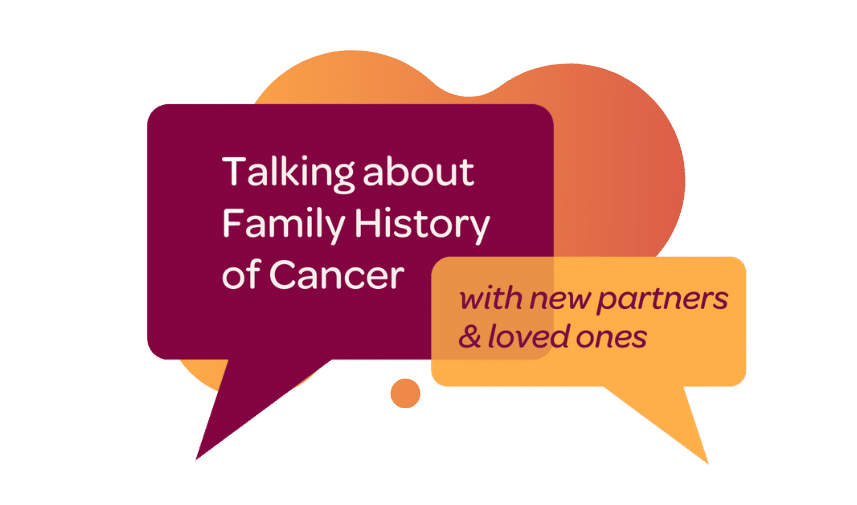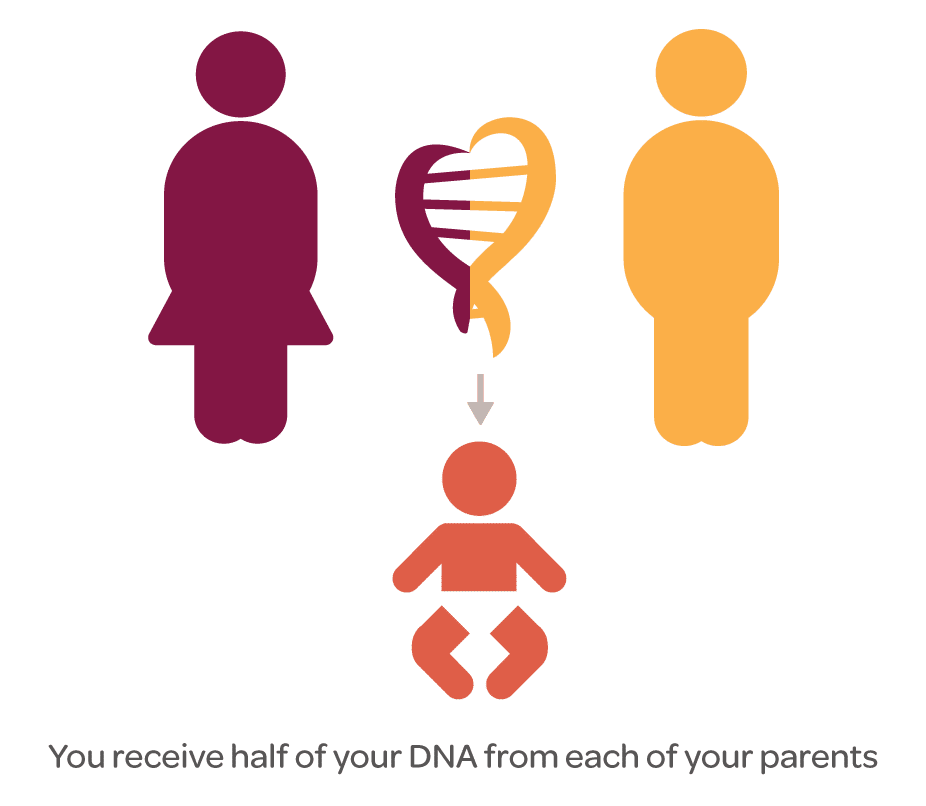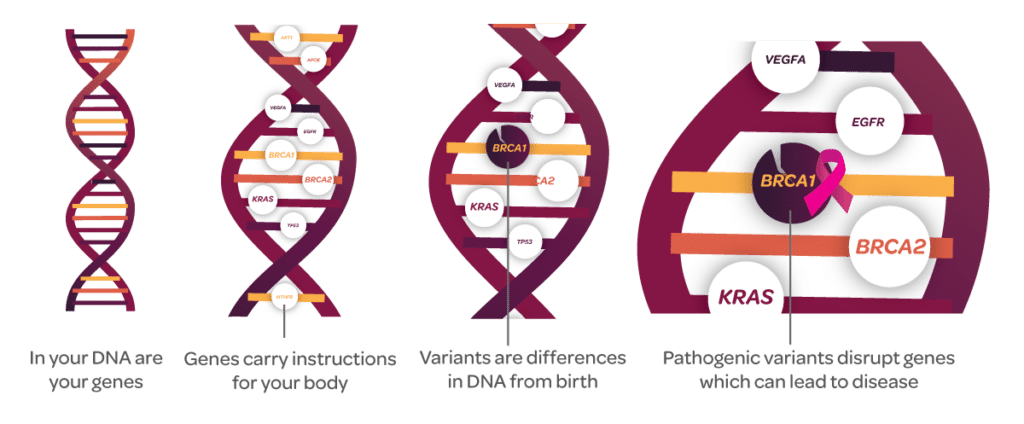
As we grow older and enter middle age, thoughts about our health and its implications for the future become more pronounced: particularly when it comes to cancer. The mere mention of “the big ‘C’” is enough to prompt us to change the subject, or even experience feelings of panic.
This is even more stressful when we try to have this discussion with a new significant other, or a loved one. In this blog post, we’ll try to better explain the implications of family cancer history and the current strengths and shortcomings in the knowledge we can gain from it, to help you better understand your risks and assist in these conversations.
Understanding Your Family History of Cancer
When approaching any medical conversation, it’s essential to be well-informed and armed with facts. Your family history can hold valuable information about potential health risks, including cancer. So, if you have a family cancer history, then it is important to understand what that means for you.
To fully understand your risk of cancer based on your family history, you need to learn a little about your DNA, and where it comes from. You receive half of your DNA from each of your parents. So, each child only has a 50% chance of inheriting any increased disease risk from one parent. This is good news, because this means that having a family history of cancer does not necessarily mean that you have an increased risk of having inherited cancer risk!

The first step to understand the implications of your families’ cancer history for you, is to have genetic testing done. If you have a parent or family member who had/has cancer, they should be the first one to get genetic testing. This testing will check their DNA to see if they have any pathogenic variants. Pathogenic variants are inherited genetic differences linked to disease. If they have a known pathogenic variant associated with their cancer, the good news is that then you can be tested for it.

Remember, there is only a 50% chance that you will have inherited this from your parent. If your parent has a pathogenic variant explaining their cancer, and you do not have your parent’s pathogenic variant, you are not considered to be at an increased risk of cancer based on your family history.
If the results from your tested family member are that they do not have any known pathogenic variants, you may think that this is “good news”. Unfortunately, the truth is that we have not identified the majority of pathogenic variants that explain family cancer. So, a negative result can just mean that we don’t know the reason for your family cancer history, and thus, we do not have anything to test you for.
Fortunately, MiraKind is working on finding additional markers of family cancer risk, see below!
What should you do if a family member with cancer is unable or unwilling to have genetic testing? It is still reasonable to have genetic testing yourself, and while this information will not be as helpful as this information paired with genetic testing from a family member, it still could be helpful for you.
Getting Genetic Testing & Seeking Professional Advice
Once you’ve decided that you want to better understand your family cancer history, it’s time to put a plan into motion. The most noteworthy part of your action plan will be seeking guidance from healthcare professionals. These experts can help you or your family member get genetic testing, and support all of you to understand any results. We’ve found that making informed choices about family planning, healthcare decisions, and preventive measures as a team can be quite empowering!
Seeking professional medical advice for genetic testing can provide the following:
- A more comprehensive assessment to help with insurance coverage
- Guidance and support in navigating the complexities of genetic testing
- Empowerment to make informed decisions based on the results
Having the Discussion
Exploring the ins and outs of potential health risks with loved ones can be anxiety-producing. Whether it’s a serious, planned discussion or a conversation that occurs naturally, the key is to create a supportive and collaborative environment when talking about serious health implications. Remember, the goal is to share information that helps you make informed decisions and support each other’s well-being.
During these discussions, it’s a good idea to openly discuss your family’s cancer history, and any known genetic testing findings that anyone is aware of. Approach the topic respectfully, allowing each other to share information openly.
In Summary:
- Understand Your Family History: Begin by gathering information about your family’s cancer history. This can offer valuable insights into potential health risks.
- Inherited Pathogenic Variants and Cancer Risk: Understand how pathogenic variants are passed from parent to offspring.
- Genetic Testing: If your parent or family member who had or has cancer is still alive, discuss genetic testing with them. This information can be essential for you to have the best understanding of your own cancer risk.
- Assess Your Individual Risk: Depending on the results of your parent’s genetic testing, you may be able to get information to help you determine your individual risk. If your parent has no known pathogenic variants, there is nothing that you can be tested for. If they do, you definitely should have testing for this pathogenic variant, remembering that there is only a 50% chance you would have inherited it.
- Stay Informed: Stay updated on the latest research and breakthroughs in cancer genetics by subscribing to relevant newsletters and reliable sources.
Growing Knowledge of Family Cancer Markers and New Advances at MiraKind
The good news is that our understanding of DNA, and the parts of the DNA that are important, has significantly advanced over recent decades. These advancements led to the discovery of non-coding RNAs, regions which make up almost 75% of the DNA, and which are critical in cell control, as well as cancer. This breakthrough paved the way for uncovering new pathogenic variants predicting family cancer risk. For example, the KRAS-variant has been linked to an increased risk of breast and ovarian cancer, offering promising possibilities for cancer prevention. Researchers, including MiraKind founder Dr. Joanne Weidhaas, have made remarkable progress in unraveling the mysteries of pathogenic variants in these recently discovered regions of the DNA, and their potential of using information about them in preventing specific cancers. And they’re just getting started.
Further Information:
- Learn about the KRAS-variant
- Understanding BRCA variants vs. the KRAS-variant
- More information on your family history of cancer and the KRAS-variant
References:
- National Cancer Institute: Cancer Genetics Risk Assessment and Counseling, 2023.
- National Library of Medicine: The KRAS-Variant Genetic Test As a Marker of Increased Risk of Ovarian Cancer, 2010.
- National Library of Medicine: Family history of breast or prostate cancer and prostate cancer risk, 2019.




Leave a Reply